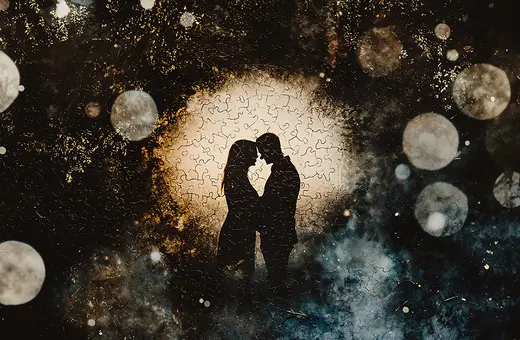Romantic love, often celebrated as one of life's greatest treasures, can also be a treacherous terrain fraught with tension and conflict. But why does this paradox persist? Inspired by Nietzsche, philosopher Tom Digby argues that notions of romantic love are entangled with gender binaries, perpetuating cycles of dominance and submission. He contends that dismantling these constructs is essential for fostering healthy, egalitarian relationships.
Romantic love often goes terribly awry, even though it can be one of the greatest sources of joy and fulfillment available to human beings. Our most obvious clue to understanding this quandary about romantic love comes from the historically prevailing notion that it is for heterosexual couples. In fact, it is supposed to be for two persons who represent not just two different sexes, but two opposite sexes. Thus, it should not be surprising that romantic love is often construed as a “battle of the sexes”.
___
According to Nietzsche – and he says this explicitly – when a man loves like a woman he becomes a slave, but when a woman loves like a woman she becomes a more perfect woman. He leaves the implicit conclusion hanging right before our eyes: the most perfect woman is a slave.
___
Conceivably, a woman and a man in a romantic relationship could be opposite to each other without being combative. Nietzsche explains the routine adversariality of heterosexual love as emanating from a tension between gender equality and romantic love. Men and women think about love differently, he says. Borrowing the language of today, Nietzsche proposes that men have a masculine understanding of love, while women have a feminine understanding of love. Those different conceptions of love are complementary, and each expects the other to act accordingly. Nietzsche says the feminine conception of love by a woman is complete devotion and unconditional surrender. That kind of love requires a woman to have a kind of faith in her partner. Nietzsche says that men expect precisely that kind of love from a woman. Men want a woman to be devoted to them, to have faith in them, to embrace subordination to them. Hence, masculine love is complementary to women’s love, but entirely different from it. It is premised on entitlement rather than devotion or surrender. Consequently, according to Nietzsche – and he says this explicitly – when a man loves like a woman he becomes a slave, but when a woman loves like a woman she becomes a more perfect woman. He leaves the implicit conclusion hanging right before our eyes: the most perfect woman is a slave. Nietzsche acknowledges that some men may experience that womanly kind of love, but they are not “real men”; in other words, they are lacking in masculinity.
I propose in my Love and War book that Nietzsche is addressing how his society – and to a significant extent, ours – culturally programs men and women to have these peculiar notions of love. He’s not giving his personal opinion about what love ought to be, nor is he generalizing about every instance of romantic love. Rather, Nietzsche is, in effect, giving us a phenomenological description of cultural programming about love and gender. He is decidedly not endorsing this male dominant/female subordinate version of love; rather, he says it leads inevitably to antagonism. While love may have evolved in complicated ways since the 19th century, Nietzsche’s insight about heterosexual antagonism is powerfully confirmed by contemporary research on interpersonal violence, which shows us that such a patriarchal notion of love regularly leads to emotional and physical abuse, torture, rape, and even murder.





















Join the conversation